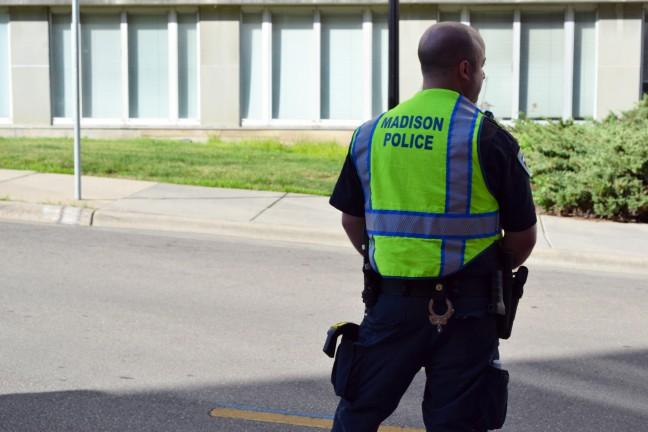In a statement released in March, the Madison Police Department called on the public for feedback as it works to develop its future goals and strategies with the creation of a five to seven year plan.
The agenda includes discourse surrounding community trust, the role of the police in Madison, crime and safety, community policing and police staffing. These community meetings have already begun across the city and will continue throughout April.
For those who feel the effects of the police system’s current inequities and unreliability, this news comes as a welcome advancement for the MPD, which has faced criticism over the past several years for its conduct. For example, the department faced a civil rights lawsuit last November for using excessive force when apprehending 17-year-old Black man David Clash-Miller.
The arrest — which occurred in 2019 — only exacerbated public concerns surrounding the use of police force and the excessive thereof. In video footage of the event, Clash-Miller can be seen being forcefully pushed onto the couch of his home before being held by multiple officers as a bag is placed over his head. This is followed by Clash-Miller being punched multiple times in the face by one of the officers on-site.
In February, state officers were responsible for the shooting of 38-year-old Quadren L. Wilson, an unarmed Black man who police shot five times in his back after a traffic collision. A few days later, protesters shut down the street where Wilson was shot and demanded answers for the excessive amount of shots fired and for the officer responsible to have their name released and to be charged accordingly.
In response to the incident, Wilson’s younger brother Mane Morris said, “We want justice. We want the officer held accountable.”
Again in late 2021, the Police Department faced another slew of backlash after one of its own officers was shot by a fellow officer on duty during a State Street chase last October. Despite a further investigation by the Wisconsin Department of Justice that determined the victim was shot by a fellow officer, MPD was criticized for initially suspecting and insinuating Katoine L. Richardson was responsible, who the officers at the scene had been attempting to apprehend.
For families who feel the consequences of the MPD’s actions firsthand, it is infuriating to see the frequent occurrence of Madison police incidents involving people of color that continue to be as prevalent as ever. In early March, Tony Robinson’s family remembered their teenage boy who was fatally shot by the police in 2015.
As of now, the officer responsible for the death, Matt Kenny, has not been convicted of any charges. Robinson’s family now hopes to bring the case to the Dane County Circuit Court for judicial review. In a statement, his aunt said, “I want to be hopeful but I’m afraid to be hopeful because it’s not worked out so well. But that doesn’t stop us from fighting.”
Supreme Court’s Wisconsin redistricting ruling continues political suppression of Black voters
The summer 2020 political uprisings against the police system following the murder of George Floyd by Minneapolis Police officer Derek Chauvin took the debate one step further. Now, there is now a national call from activist groups across the country to abolish the police. Madison is no exception, with the local Freedom Inc. activist group supporting supporting abolishing MPD.
Also in response to public outcry, institutions across the city have taken measures to distance themselves from the police and stand in solidarity with minority groups who have been disproportionately and unfairly affected by police misconduct. In 2020, the Madison School Board of Education voted unanimously to sever its ties with the MPD, with several of the board’s members emphasizing that George Floyd’s murder was only an exacerbation of how the institution as a whole is incompatible with MMSD’s learning environment for its students of color.
One thing is clear during this time of disproportionate police violence against people of color — a lack of accountability for law enforcement and public outcry to defund police departments or be abolished reveals the system we have now is not working.
If MPD is to remain operational or publicly funded, it must take concrete measures of change. This cannot only include holding officers responsible for past actions of misconduct, but also defined goals to change the way the MPD operates going forward. The first step toward progress is to bring the conversation directly to those affected by the police — Madison residents.
Amazon needs new approach to community input for Cottage Grove warehouse project
By including the community directly in reform suggestions and policy creation, it will be easier to identify and prosecute instances of police misconduct. One of the issues that we have seen with our nation’s police system is the ease with which acts of wrongdoing can be hidden from public scrutiny. By making the MPD and the Madison community co-authors of this new plan, this risk decreases.
This is not only an important step forward because of this newfound police accountability but also because of the message it sends. For the police to make substantive steps forward, they need to foster a connection with the people they serve and marginalized communities harmed by law enforcement. This disconnect between officers and citizens contributes to police violence.
Our nation’s police system needs serious reform, and Madison’s local force is no exception. This long-term strategic development plan is an essential step toward changing how the department operates — and including community engagement is a vital part of this process.
Fiona Hatch ([email protected]) is a freshman studying political science and international studies.














